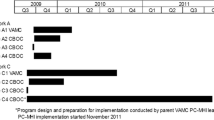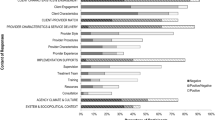Abstract
This study examined providers’ reflections on delivering managing and adapting practice (MAP), an evidence-informed framework that guides decision-making from scientific and client data. Consensual qualitative research methods were used to analyze the reflections of 201 youth mental health providers. Results indicated that providers approached MAP according to their own preferences and particular cases. While most appeared to approach MAP from a practice management standpoint, when faced with challenging cases, providers used coordination and outcomes management resources. Regardless of approach, most providers came to appreciate the full framework through reflective practice. Their diverse approaches offer lessons for evidence-based practice implementation and sustainment.
Similar content being viewed by others
Notes
Not all providers described each domain in their case examples and their perceptions of MAP. Consequently, all percentages reflect the percent of participants who indicated a response (numerator) out of all people who gave a response relevant for the domain (denominator).
Participants were asked which practice guide(s) they used, if any, when describing their successful and challenging cases. No inquiries were made into other MAP resources. Consequently, participants may have been primed to describe these resources more than other resources.
References
Becker, K. D., Lee, B., Daleiden, E., Lindsey, M., Brandt, N., & Chorpita, B. (2015). The common elements of engagement in children’s mental health: Which elements for which outcomes? Journal of Clinical Child and Adolescent Psychology, 44, 30–43. https://doi.org/10.1080/15374416.2013.814543.
Burchard, J. D., Bruns, E. J., & Burchard, S. N. (2002). The wraparound process. In B. J. Burns & K. Hoagwood (Eds.), Community-based treatment for youth (pp. 66–90). Oxford: Oxford University Press.
Chorpita, B. F., Bernstein, A. D., Daleiden, E. L., & the Research Network on Youth Mental Health. (2008). Driving with roadmaps and dashboards: Using information resources to structure the decision models in service organizations. Administration and Policy in Mental Health and Mental Health Services Research, 35, 114–123. https://doi.org/10.1007/s10488-007-0151-x.
Chorpita, B. F., & Daleiden, E. L. (2014). Structuring the collaboration of science and service in pursuit of a shared vision. Journal of Clinical Child and Adolescent Psychology, 43, 323–338. https://doi.org/10.1080/15374416.2013.828297.
Chorpita, B. F., Daleiden, E. L., & Collins, K. S. (2014). Managing and adapting practice: A system for applying evidence in clinical care with youth and families. Clinical Social Work Journal, 42, 134–142. https://doi.org/10.1007/s10615-013-0460-3.
Davis, F. D. (1989). Perceived usefulness, perceived ease of use, and user acceptance of information technology. MIS Quarterly, 13, 319–340. https://doi.org/10.2307/249008.
Edmunds, M. (1997). Managing managed care: Quality improvements in behavioral health. Washington, D.C: National Academy Press.
Ferreira, J. F., Basseches, M., & Vasco, A. B. (2017). Guidelines for reflective practice in psychotherapy: A reflection on the benefits of combining moment-by-moment and phase-by-phase mapping in clinical decision making. Journal of Psychotherapy Integration, 27, 35–46. https://doi.org/10.1037/int0000047.
Hill, C. E., Thompson, B. J., & Williams, E. N. (1997). A guide to conducting consensual qualitative research. The Counseling Psychologist, 25, 517–572. https://doi.org/10.1177/0011000097254001.
Malone, T. W., Lai, K., & Grant, K. R. (2001). Two design principles for collaboration technology: Examples of semiformal systems and radical tailorability. In G. M. Olson, T. W. Malone, & J. B. Smith (Eds.), Coordination theory and collaboration technology (pp. 125–160). New York: Psychology Press.
Marshall, C., & Rossman, G. B. (2016). Designing qualitative research (6th ed.). Los Angeles: Sage.
McHugh, R. K., & Barlow, D. H. (2010). The dissemination and implementation of evidence-based psychological treatments: A review of current efforts. American Psychologist, 65, 73–84. https://doi.org/10.1037/a0018121.
Mennen, F. E., Cederbaum, J., Chorpita, B. F., Becker, K., Lopez, O., & Sela-Amit, M. (2018). The large-scale implementation of evidence-informed practice into a specialized MSW curriculum. Journal of Social Work Education, 54, S56–S64. https://doi.org/10.1080/10437797.2018.1434440.
Nguyen, Q. D., Fernandez, N., Karsenti, T., & Charlin, B. (2014). What is reflection? A conceptual analysis of major definitions and a proposal of a five-component model. Medical Education, 48, 1176–1189. https://doi.org/10.1111/medu.12583.
Reding, M. E. J., Chorpita, B. F., Lau, A. S., & Innes-Gomberg, D. (2014). Providers’ attitudes toward evidence-based practices: Is it just about providers, or do practices matter, too? Administration and Policy in Mental Health and Mental Health Services Research, 41, 767–776. https://doi.org/10.1007/s10488-013-0525-1.
Rodriguez, A., Lau, A. S., Wright, B., Regan, J., & Brookman-Frazee, L. (2018). Mixed-method analysis of program leader perspectives on the sustainment of multiple child evidence-based practices in a system-driven implementation. Implementation Science, 13, 44–57. https://doi.org/10.1186/s13012-018-0737-6.
Schön, D. A. (1983). The reflective practitioner: How professionals think in action. New York: Basic Books.
Shimokawa, K., Lambert, M. J., & Smart, D. W. (2010). Enhancing treatment outcome of patients at risk of treatment failure: Meta-analytic and mega-analytic review of a psychotherapy quality assurance system. Journal of Consulting and Clinical Psychology, 78, 298–311. https://doi.org/10.1037/a0019247.
Southam-Gerow, M. A., Daleiden, E. L., Chorpita, B. F., Bae, C., Mitchell, C., Faye, M., et al. (2014). MAPping Los Angeles County: Taking an evidence-informed model of mental health care to scale. Journal of Clinical Child and Adolescent Psychology, 43, 190–200. https://doi.org/10.1080/15374416.2013.833098.
Thomas, M. D., Blacksmith, J., & Reno, J. (2000). Utilizing insider-outsider research teams in qualitative research. Qualitative Health Research, 10, 819–828. https://doi.org/10.1177/104973200129118840.
Venkatesh, V., & Davis, F. D. (1996). A model of the antecedents of perceived ease of use: Development and test. Decision Sciences, 27, 451–481. https://doi.org/10.1111/j.1540-5915.1996.tb00860.x.
Wandersman, A., Chien, V. H., & Katz, J. (2012). Toward an evidence-based system for innovation support for implementing innovations with quality: Tools, training, technical assistance, and quality assurance/quality improvement. American Journal of Community Psychology, 50, 445–459. https://doi.org/10.1007/s10464-012-9509-7.
Author information
Authors and Affiliations
Corresponding author
Ethics declarations
Conflicts of interest
Bruce F. Chorpita is President and Eric L. Daleiden is Chief Operating Officer of PracticeWise, LLC, a private behavioral health consulting corporation. Kimberly D. Becker is a consultant to PracticeWise, LLC.
Ethical Approval
The University of South Carolina’s Institutional Review Board determined that this study was exempt from review.
Informed Consent
This study was conducted on already available data for which formal consent was not needed due to the nature of data collected.
Additional information
Publisher's Note
Springer Nature remains neutral with regard to jurisdictional claims in published maps and institutional affiliations.
Rights and permissions
About this article
Cite this article
Buckingham, S.L., Becker, K.D., Reding, M. et al. Managing and Adapting Practice: Provider Perceptions of an Evidence-Informed Framework for Delivering Mental Health Services. Adm Policy Ment Health 46, 777–789 (2019). https://doi.org/10.1007/s10488-019-00957-8
Published:
Issue Date:
DOI: https://doi.org/10.1007/s10488-019-00957-8




